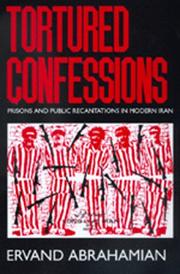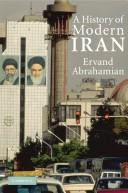| Listing 1 - 3 of 3 |
Sort by
|

ISBN: 0520922905 0585081263 0520218663 0520216237 9780520922907 9780585081267 9780520216235 9780520218666 Year: 1999 Publisher: Berkeley, California : University of California Press,
Abstract | Keywords | Export | Availability | Bookmark
 Loading...
Loading...Choose an application
- Reference Manager
- EndNote
- RefWorks (Direct export to RefWorks)
The role of torture in recent Iranian politics is the subject of Ervand Abrahamian's important and disturbing book. Although Iran officially banned torture in the early twentieth century, Abrahamian provides documentation of its use under the Shahs and of the widespread utilization of torture and public confession under the Islamic Republican governments. His study is based on an extensive body of material, including Amnesty International reports, prison literature, and victims' accounts that together give the book a chilling immediacy. According to human rights organizations, Iran has been at the forefront of countries using systematic physical torture in recent years, especially for political prisoners. Is the government's goal to ensure social discipline? To obtain information? Neither seem likely, because torture is kept secret and victims are brutalized until something other than information is obtained: a public confession and ideological recantation. For the victim, whose honor, reputation, and self-respect are destroyed, the act is a form of suicide. In Iran a subject's "voluntary confession" reaches a huge audience via television. The accessibility of television and use of videotape have made such confessions a primary propaganda tool, says Abrahamian, and because torture is hidden from the public, the victim's confession appears to be self-motivated, increasing its value to the authorities. Abrahamian compares Iran's public recantations to campaigns in Maoist China, Stalinist Russia, and the religious inquisitions of early modern Europe, citing the eerie resemblance in format, language, and imagery. Designed to win the hearts and minds of the masses, such public confessions--now enhanced by technology--continue as a means to legitimize those in power and to demonize "the enemy.".
Torture --- Political prisoners --- Confession (Law) --- Punishment --- Social Welfare & Social Work --- Social Sciences --- Criminology, Penology & Juvenile Delinquency --- Iran --- Politics and government. --- Prisoners of conscience --- Criminal procedure --- Evidence, Criminal --- Evidence (Law) --- Prisoners --- Cruelty --- Extraordinary rendition --- IranxPolitics and government. --- Political science. --- República Islâmica do Irã --- Irã --- Persia --- Northern Tier --- Islamic Republic of Iran --- Jumhūrī-i Islāmī-i Īrān --- I-lang --- Paras-Iran --- Paras --- Persia-Iran --- I.R.A. --- Islamische Republik Iran --- Islamskai︠a︡ Respublika Iran --- I.R.I. --- IRI --- ايران --- جمهورى اسلامى ايران --- Êran --- Komarî Îslamî Êran --- amnesty international reports. --- banned torture in 20th century. --- chilling. --- confessions a primary propaganda tool. --- disturbing. --- documentation of use under shahs. --- islamic republican governments. --- prison literature. --- role of torture in iranian politics. --- systematic physical torture. --- torture and public confession. --- victims accounts.

ISBN: 9780521528917 9780521821391 9780511984402 9780511415357 0511415354 0521528917 0521821398 0511984405 9780511412134 0511412134 1107174503 1107385792 1281751332 9786611751333 0511414676 0511413076 0511413998 9781107385795 9780511413070 Year: 2008 Publisher: Cambridge : Cambridge University Press,
Abstract | Keywords | Export | Availability | Bookmark
 Loading...
Loading...Choose an application
- Reference Manager
- EndNote
- RefWorks (Direct export to RefWorks)
In a reappraisal of Iran's modern history, Ervand Abrahamian traces its traumatic journey across the twentieth century, through the discovery of oil, imperial interventions, the rule of the Pahlavis and, in 1979, revolution and the birth of the Islamic Republic. In the intervening years, the country has experienced a bitter war with Iraq, the transformation of society under the clergy and, more recently, the expansion of the state and the struggle for power between the old elites, the intelligentsia and the commercial middle class. The author is a compassionate expositor. While he adroitly negotiates the twists and turns of the country's regional and international politics, at the heart of his book are the people of Iran. It is to them and their resilience that this book is dedicated, as Iran emerges at the beginning of the twenty-first century as one of the most powerful states in the Middle East.
History of Asiaanno 1800-1999Iran --- History of Asia --- anno 1800-1999 --- Iran --- History --- Arts and Humanities
Book

ISBN: 0872868311 Year: 2020 Publisher: City Lights Publishers
Abstract | Keywords | Export | Availability | Bookmark
 Loading...
Loading...Choose an application
- Reference Manager
- EndNote
- RefWorks (Direct export to RefWorks)
"The U.S. and Iran are locked in a dangerous cycle of brinksmanship and violence. Both countries have staged cyber attacks and recently shot down one another's aircrafts. Why do both countries seem intent on escalation? Why did the U.S. abandon the nuclear deal (which, according to the UN, was working)? Where can Washington and Tehran find common ground? To address these questions and the political and historical forces at play, David Barsamian presents the perspectives of Iran scholars Ervand Abrahamian, Noam Chomsky, Nader Hashemi, Azadeh Moaveni, and Trita Parsi. A follow-up to the previously published Targeting Iran, this timely and urgent book continues to affirm the goodwill between Iranian and American people, even as their respective governments clash on the international stage"--
Nuclear nonproliferation --- International cooperation. --- Trump, Donald, --- United States --- Iran --- Foreign relations --- Politics and government --- Social conditions
| Listing 1 - 3 of 3 |
Sort by
|

 Search
Search Feedback
Feedback About
About Help
Help News
News